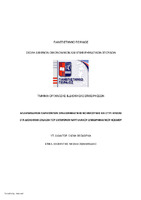| dc.description.abstractEN | Trait Emotional Intelligence (TEI) is a research construct that has attracted widespread
attention from both Industrial Psychology and Management Science researchers. As to
provide an updated and evidence-based picture on the effects of Trai-El in the Shipping
workplace, this study examined both the qualitative and quantitative relationships
between TEl (TEIQue) and Leadership Styles (MLQ) variables, in a typicalshipping corporate
environment. Two instruments were used to collect research data relevant to the study.
The Trait Emotional Intelligence Questionnaire (TEIQue-Petrides & Furnham, 2003)
measuring trait emotional intelligence; and the Multifactor Leadership Questionnaire
(MLQ-Avolio & Bass, 1991), measuring leadership style, as well as six (6) demographic
questions were completed by the participants (N=246). Using a qualitative analytic
approach, the total sample was analyzed by utilizing One-Way ANOVA for both TEI and
MLQ per demographic variable (Gender, Hierarchy level & Experience level). Also, a
quantitative approach was followed, where trait emotional intelligence orientation was
matched and examined with the specific leadership style, to draw conclusions on the
possible relationship and/or inter-relationship between the two constructs (TEIQ-MLQ).
The regression results revealed that Trait Emotional Intelligence (TEI) was not a predictor
of Transformational Leadership style and that it has no significant associations with either
Transactional Leadership or Laissez Faire Leadership styles. The stepwise regression
analysis revealed that specific factors of the Trait-EI construct are predictors of either
Transformational Leadership style (TEI_WellBeing, TEI_Self-Control, Energy/Motivation/Adaptability and TEI_Sociability TEI are negative predictors of the
Laissez Faire Leadership style. Moreover, the regression findings of the current study
between Trait-EI and Job-related outcomes, call for future quantitative research on either
the mediation role or moderation role of the Trait-EI -if any-between the MLQ variables
and the variables of Job-Related Outcomes (Effectiveness, Efficiency and Job Satisfaction). | el |



